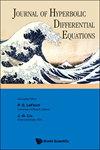双曲守恒律中的最优跳集
IF 1.1
4区 数学
Q4 MATHEMATICS, APPLIED
引用次数: 0
摘要
我们研究了双曲守恒律熵解的定性性质,并构造了一个标量守恒律的熵解,其中跳跃集不是闭合的,特别是在时空域中是稠密的。在第二部分中,我们建立了双曲型系统的类似结果。为了得到这些结果,我们给出了标量守恒定律和双曲系统的两种不同方法。对于标量情况,解是显式计算的。本文章由计算机程序翻译,如有差异,请以英文原文为准。
Optimal jump set in hyperbolic conservation laws
We investigate qualitative properties of entropy solutions to hyperbolic conservation laws, and construct an entropy solution to a scalar conservation law for which the jump set is not closed, in particular, it is dense in a space-time domain. In a second part, we establish a similar result for hyperbolic systems. We give two different approaches for scalar conservation laws and hyperbolic systems in order to obtain these results. For the scalar case, the solutions are explicitly calculated.
求助全文
通过发布文献求助,成功后即可免费获取论文全文。
去求助
来源期刊

Journal of Hyperbolic Differential Equations
数学-物理:数学物理
CiteScore
1.10
自引率
0.00%
发文量
15
审稿时长
24 months
期刊介绍:
This journal publishes original research papers on nonlinear hyperbolic problems and related topics, of mathematical and/or physical interest. Specifically, it invites papers on the theory and numerical analysis of hyperbolic conservation laws and of hyperbolic partial differential equations arising in mathematical physics. The Journal welcomes contributions in:
Theory of nonlinear hyperbolic systems of conservation laws, addressing the issues of well-posedness and qualitative behavior of solutions, in one or several space dimensions.
Hyperbolic differential equations of mathematical physics, such as the Einstein equations of general relativity, Dirac equations, Maxwell equations, relativistic fluid models, etc.
Lorentzian geometry, particularly global geometric and causal theoretic aspects of spacetimes satisfying the Einstein equations.
Nonlinear hyperbolic systems arising in continuum physics such as: hyperbolic models of fluid dynamics, mixed models of transonic flows, etc.
General problems that are dominated (but not exclusively driven) by finite speed phenomena, such as dissipative and dispersive perturbations of hyperbolic systems, and models from statistical mechanics and other probabilistic models relevant to the derivation of fluid dynamical equations.
Convergence analysis of numerical methods for hyperbolic equations: finite difference schemes, finite volumes schemes, etc.
 求助内容:
求助内容: 应助结果提醒方式:
应助结果提醒方式:


